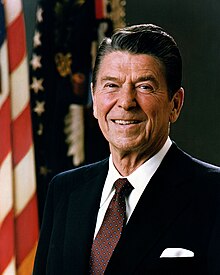
Richard Milhous Nixon was the 37th president of the United States, serving from 1969 to 1974. A member of the Republican Party, he previously served as a representative and senator from California and as the 36th vice president from 1953 to 1961 under President Dwight D. Eisenhower. His presidency saw the reduction of U.S. involvement in the Vietnam War, détente with the Soviet Union and China, the Apollo 11 Moon landing, and the establishment of the Environmental Protection Agency and Occupational Safety and Health Administration. Nixon's second term ended early when he became the only U.S. president to resign from office, as a result of the Watergate scandal.

The Watergate scandal was a significant political controversy in the United States during the presidency of Richard Nixon from 1972 to 1974, ultimately resulting in Nixon's resignation. It originated from attempts by the Nixon administration to conceal its involvement in the June 17, 1972, break-in at the Democratic National Committee headquarters located in the Watergate Office Building in Washington, D.C.
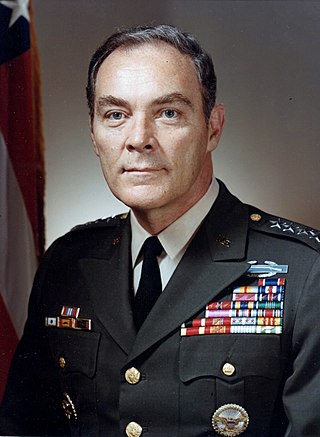
Alexander Meigs Haig Jr. was United States secretary of state under president Ronald Reagan and White House chief of staff under presidents Richard Nixon and Gerald Ford. Prior to and in between these cabinet-level positions, he was a general in the U.S. Army, serving first as the vice chief of staff of the Army and then as Supreme Allied Commander Europe. In 1973, Haig became the youngest four-star general in the Army's history.

The history of the United States from 1964 to 1980 includes the climax and end of the Civil Rights Movement; the escalation and ending of the Vietnam War; the drama of a generational revolt with its sexual freedoms and use of drugs; and the continuation of the Cold War, with its Space Race to put a man on the Moon. The economy was prosperous and expanding until the recession of 1969–70, then faltered under new foreign competition and the 1973 oil crisis. American society was polarized by the ultimately futile war and by antiwar and antidraft protests, as well as by the shocking Watergate affair, which revealed corruption and gross misconduct at the highest level of government. By 1980 and the seizure of the American Embassy in Iran, including a failed rescue attempt by U.S. armed forces, there was a growing sense of national malaise.

Elliot Lee Richardson was an American lawyer and Republican politician. As a member of the cabinets of Richard Nixon and Gerald Ford between 1970 and 1977, Richardson is one of two men in United States history to hold four cabinet positions. As United States Attorney General, Richardson played a prominent role in the Watergate scandal when he resigned in protest against President Nixon's order to fire special prosecutor Archibald Cox. His resignation precipitated a crisis of confidence in Nixon which ultimately led to the president's resignation.

Howard Henry Baker Jr. was an American politician, diplomat and photographer who served as a United States Senator from Tennessee from 1967 to 1985. During his tenure, he rose to the rank of Senate Minority Leader and then Senate Majority Leader. A member of the Republican Party, Baker was the first Republican to be elected to the US Senate in Tennessee since the Reconstruction era.

Gerald Ford's tenure as the 38th president of the United States began on August 9, 1974, upon the resignation of president Richard Nixon, and ended on January 20, 1977. Ford, a Republican from Michigan, had been appointed vice president since December 6, 1973, following the resignation of Spiro Agnew from that office. Ford was the only person to serve as president without being elected to either the presidency or the vice presidency. His presidency ended following his narrow defeat in the 1976 presidential election to Democrat Jimmy Carter, after a period of 895 days in office.

Larry Melvin Speakes was an American journalist and spokesperson who acted as White House Press Secretary under President Ronald Reagan from 1981 to 1987. He assumed the role after Press Secretary James Brady was shot on March 30, 1981.

Mary Louise Smith, a U.S. political organizer and women's rights activist, was the second woman to become chair of a major political party in the United States.

The Watergate scandal refers to the burglary and illegal wiretapping of the headquarters of the Democratic National Committee, in the Watergate complex by members of President Richard Nixon's re-election campaign, and the subsequent cover-up of the break-in resulting in Nixon's resignation on August 9, 1974, as well as other abuses of power by the Nixon White House that were discovered during the course of the scandal.

Gerald Rudolph Ford Jr. was an American politician who served as the 38th president of the United States from 1974 to 1977. He previously served as the leader of the Republican Party in the U.S. House of Representatives from 1965 to 1973, and as the 40th vice president under President Richard Nixon from 1973 to 1974. Ford succeeded to the presidency when Nixon resigned in 1974, but was defeated for election to a full term in 1976. Ford is the only person to serve as president and vice president without being elected to either office.
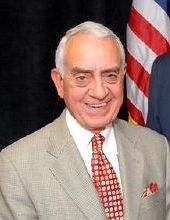
Kenneth L. Khachigian is an American political consultant, speechwriter, and attorney. He is best known for being a longtime aide to President Richard Nixon and chief speechwriter to President Ronald Reagan.
This bibliography of Richard Nixon includes publications by Richard Nixon, the 37th president of the United States, and books and scholarly articles about him and his policies.
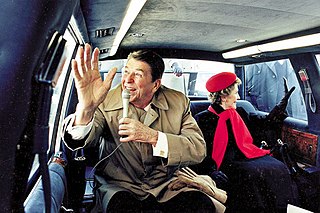
This is the electoral history of Ronald Reagan. Reagan, a Republican, served as the 40th president of the United States (1981–1989) and earlier as the 33rd governor of California (1967–1975). At 69 years, 349 days of age at the time of his first inauguration, Reagan was the oldest person to assume the presidency in the nation's history, until Donald Trump was inaugurated in 2017 at the age of 70 years, 220 days. In 1984, Reagan won re-election at the age of 73 years, 274 days, and was the oldest person to win a US presidential election until Joe Biden won the 2020 United States presidential election at the age of 77 years, 349 days.
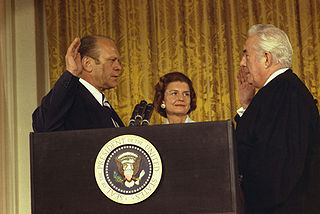
The inauguration of Gerald Ford as the 38th president of the United States was held on Friday, August 9, 1974, in the East Room of the White House in Washington, D.C., after President Richard Nixon resigned due to the Watergate scandal. The inauguration – the last non-scheduled, extraordinary inauguration to take place in the 20th century – marked the commencement of Gerald Ford's only term as president. Chief Justice Warren E. Burger administered the oath of office. The Bible upon which Ford recited the oath was held by his wife, Betty Ford, open to Proverbs 3:5–6. Ford was the ninth vice president to succeed to the presidency intra-term, and he remains the most recent to do so, as of 2024.

The Reagan era or the Age of Reagan is a periodization of recent American history used by historians and political observers to emphasize that the conservative "Reagan Revolution" led by President Ronald Reagan in domestic and foreign policy had a lasting impact. It overlaps with what political scientists call the Sixth Party System. Definitions of the Reagan era universally include the 1980s, while more extensive definitions may also include the late 1970s, the 1990s, and even the 2000s. In his 2008 book, The Age of Reagan: A History, 1974–2008, historian and journalist Sean Wilentz argues that Reagan dominated this stretch of American history in the same way that Franklin D. Roosevelt and his New Deal legacy dominated the four decades that preceded it.
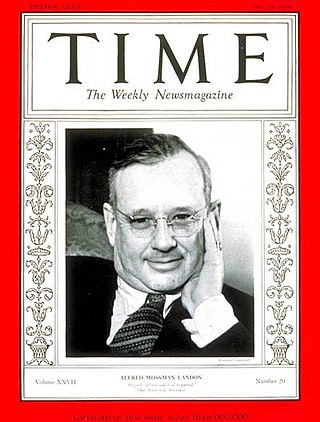
The Alfred M. Landon Lecture Series is a series of speeches on current public affairs, which is organized and hosted by Kansas State University, in Manhattan, Kansas, United States. It is named after Kansas politician Alf Landon, former Governor of Kansas and Republican presidential candidate. The first lecture in the series was given by Landon on December 13, 1966.

This article lists those who were potential candidates for the Republican nomination for Vice President of the United States in the 1980 election. Former California Governor Ronald Reagan won the 1980 Republican nomination for President of the United States, and chose former CIA Director George H. W. Bush as his running mate.

On October 10, 1973, Vice President Spiro Agnew was forced to resign following a controversy over his personal taxes. Under the terms of the 25th Amendment, a vice presidential vacancy is filled when the president nominates a candidate who is confirmed by both houses of Congress. President Richard Nixon thus had the task of selecting a vice president who could receive the majority support of both houses of Congress, which were then controlled by the Democrats.

